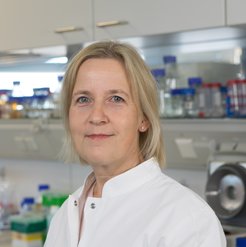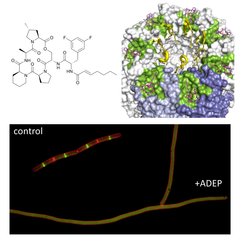Heike Brötz-Oesterhelt
Novel antibiotics and their mechanisms of action
University of Tübingen
Faculty in: IMPRS

Vita
- PhD at the Institute of Medical Microbiology, University of Bonn, 1993-97
- Industry positions at Bayer HealthCare and AiCuris GmbH & Co.KG (co-founder), Wuppertal
- Professor for Pharmaceutical Biology, University of Düsseldorf, 2010-14
- Full Professor and Department Head at IMIT since 2014
- Co-speaker of the Cluster of Excellence “Controlling Microbes to Fight Infection”
Research Interest
The alarming worldwide spread of bacterial resistance causes an urgent need for new effective antibiotics. We study novel antibacterial agents, predominately bacterial products from various origins. Microbial natural products are privileged structures for antibiotic discovery, having emerged in a long period of co-evolution between antibiotic producing strains and bacterial target species.
One research focus is on the elucidation of the molecular mechanisms of action of these new agents by an array of microbiological, biochemical and genetic techniques. We apply our continuously expanding mode-of-action discovery platform, containing a variety of cell-based and extract-based assays to pinpoint the metabolic process inhibited. For the in-depth mechanistic characterization of a target, available technologies include mutant libraries, cutting-edge fluorescence and atomic force microscopy, interaction studies as well as an array of functional assays. Physiological consequences of compound application to bacterial cells are monitored to detect potential multiplicity of action. The overall lead potential of novel antibacterial agents is evaluated, uptake routes into bacterial cells are studied and together with collaborating chemists, compounds are modified towards increased therapeutic potential. In addition, we use our agents as tools to study the biological function of new targets and the cellular consequences of their inhibition.

Available PhD Projects
- Currently not recruiting PhD students
Selected Reading
- Berscheid A, Straetener J, Schilling NA, Ruppelt D, Konnerth MC, … Brötz-Oesterhelt. The microbiome-derived antibacterial lugdunin acts as a cationic ionophore in synergy with host peptides. mbio 15 (9), doi.org/10.1128/mbio.00578-24 (2024)
- Leeten, K, Jaques N, Esquembre LA, Schneider DC, … Brötz-Oesterhelt*, Lancellotti P, Oury C*. Ticagrelor alters the membrane of Staphylococcus aureus and enhances the activity of vancomycin and daptomycin without eliciting cross-resistance. mBio 15 (10) doi.org/10.1128/mbio.01322-24 (2024)
- Lewis K, Lee RE, Brötz-Oesterhelt H, Hiller S, Rodnina MV, Schneider T, Weingarth M, Wohlgemuth I. Sophisticated natural products as antibiotics. Nature 632, 39–49, doi.org/10.1038/s41586-024-07530-w (2024)

